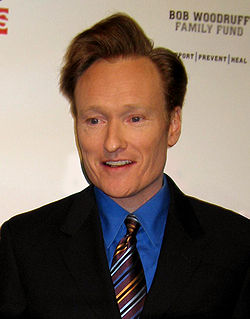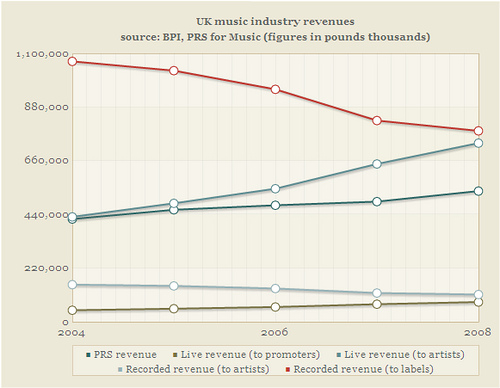Still, people don’t seem to find these examples very persuasive. Many people have an intuition that there are some kinds of content (television, radio, weekly newspapers, blogs) that are naturally monetized through ads, and there are other kinds of content (books, movies, CDs) that can only be monetized effectively by selling copies. So let’s take a look at an industry that has traditionally been focused on the sale of copies, but is currently seeing that business model challenged: the music industry.
It’s important to draw a distinction between the recording industry and the broader music industry of which it is a part. I think we all want a future in which enough musicians can make a living that we’ll have a generous supply of recorded music to listen to. But it won’t necessarily continue to be produced be produced by the small number of vertically-integrated, high-overhead firms that dominated the recording industry in the late 20th century.
The recording industry is doing poorly, but the news in the broader music industry isn’t so grim. Check out this chart from the Times of London spotted (as usual) by Mike Masnick:
The red line at the top, “recorded revenue (to labels)” is the one that has been getting all the press lately. It’s falling like a rock, whcih is bad news for the employees and shareholders of record labels. The light green line, “live revenue (to artists)” hasn’t gotten as much attention, but I think it’s just as important. It’s going up rapidly, and that’s good news for musicians. The dark green line below that, “PRS revenue,” are the royalties paid when copyrighted music is played in public venues. As we might expect, this revenue stream has been relatively constant over the last few years.
If you’re a British musician, this chart is fantastic news. The bulk of the revenue from CD sales go to labels, not artists. In contrast, musicians get the lion’s share of live show revenues. And so if consumers are shifting their spending from CDs to concert tickets, that’s great news for musicians. Moreover, this chart makes clear the fundamentally antagonistic relationship between musicians and their labels. When a customer buys a CD, most of the revenue goes to the label. When a customer buys a concert ticket, most of the revenue goes to the musician. So the musician’s interest is in having as many people as possible listen to her music, whether or not they pay for it. In contrast, the label wants to maximize CD sales, regardless of the effect of the band’s fan base. This analysis helps explain the ridiculous situation where OK Go has been prevented by its label from allowing embedding of its latest music videos. The benefits of embedding—a larger fan base—accrue mostly to OK Go. The benefits of disabling embedding—slightly higher YouTube ad revenues—accrue mostly to EMI.
Now, to reiterate the point I made yesterday: I don’t think this argument means it’s OK to break the law. Musicians signed contracts giving labels the exclusive right to sell their music, and I think musicians and their fans should respect those contracts. But this analysis does suggest that signing a contract with a major label is increasingly a bad deal for musicians. And it suggests that the decline of the recording industry isn’t a particualrly negative development from the musician’s perspective.
So to turn the discussion of the book industry, we need to sharply distinguish between the interests of authors and the interests of traditional publishing industry. The publishing industry is structured a lot like the recording industry: royalties to authors are a relatively small fraction of the purchase price of a book (around 10-15 percent). And if e-books displace paper books (which I actually think will take a long time), those costs will go away. And so the revenue per reader that will be required to support a given number of authors will be much lower with e-books than with paper books.
Where will that revenue come from? Markets are unpredictable, so it would be stupid for me to make a specific prediction. But here are some ideas to illustrate the kind of strategies authors might pursue.
Book tours are one obvious revenue source of revenue. Right now, the business model for books is that authors go on book tours to encourage people to buy their books, much as musicians once went on tours primarily to promote the sales of their CDs. But there’s no reason things couldn’t work the other way around, as they’re starting to with music: authors give away e-books to build a fan base, and then go on book tours so that people who have already read and enjoyed the book can pay to meet the author and hear her talk about it.
Advertising is another obvious source of revenue. Books don’t currently have many ads because advertising is a time-sensitive medium and people often don’t read books until months after they’re printed. But e-books could change that equation. A related trend we might see, as suggested by commenter Tim Baker, is a return to the serialization model that was popular in the 19th century. Rather than writing an entire book and releasing it all at once, an author could release a series of advertising-supported chapters. This might make it easier to sell advertising, but it also has a more important advantage. It allows the author to get feedback from readers as he goes along, learning what readers like or dislike about the story so far, and giving feedback about whether to continue working on that story or start another one. Mike Masnick may be a pioneer here as well. His book Approaching Infinity started as a series of blog posts on the economics of infinite goods (collecting ad revenues along the way), and then he turned the posts into a printed book, which he sold to people who were already Techdirt readers.Finally, for non-fiction authors, there’s a large category of business models where the book is a promotional vehicle for the author’s services. Actually, there’s nothing new about this. Many people write books to promote the author’s consulting business, raise his speaking fees, or help the author get tenure. Being famous is valuable, and once you’re famous it’s not too hard to find ways to parlay that fame into cold, hard cash.
Obviously these aren’t the only options. Two safe predictions are that the book market of the 21st century will be much more diverse than the 20th century, and that some of the new business models will be things people haven’t thought of yet. But the fundamental point is that there’s nothing particularly special about the e-book market. As the price of e-books falls, books will continue to be a viable way to make a living, just as writing blog posts, recording music, and hosting talk shows are.






The answer to your caption is “no.” I just love Canadians.
“Is Will Wilkinson monetizing his celebrity?”
There was a short segment on the comedy central show Tosh.0 where the host sold his last season cardigan on ebay for 500$, over the original price of 200$, and proceeds to claim that his celebrity is now worth 300$, so everything he touches is now worth 300 dollars more.
Found it:
http://www.comedycentral.com/videos/index.jhtml?videoId=261671&title=sweater-sale
Will, take notes! What do you think you could get for that shirt above?
Lemme get this straight: Ad-supported books? What’s next? Authors begging for product-placement fees? (“Marlowe started his new ’55 Chevrolet Bel-Air hardtop with the 265 V8 and Powerglide transmission, which he paid only $2285 for from Yenko Chevrolet, and went after the kidnappers who had his client, the nice dame who paid cash up front…”)
Um, no. That’s sort of the point: to get the frak away from ads for a while.